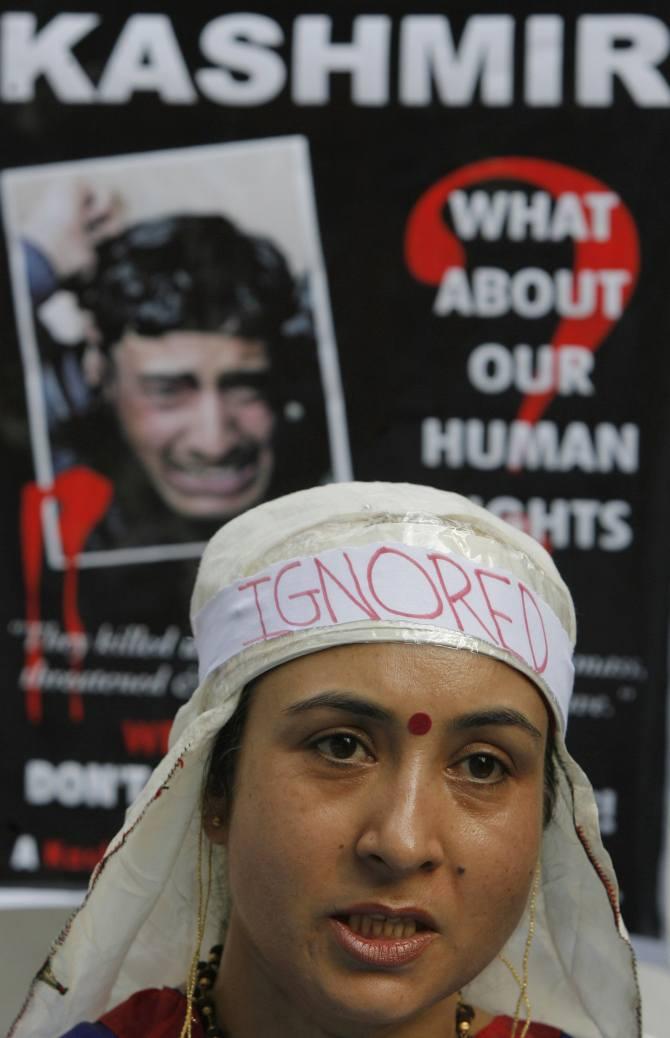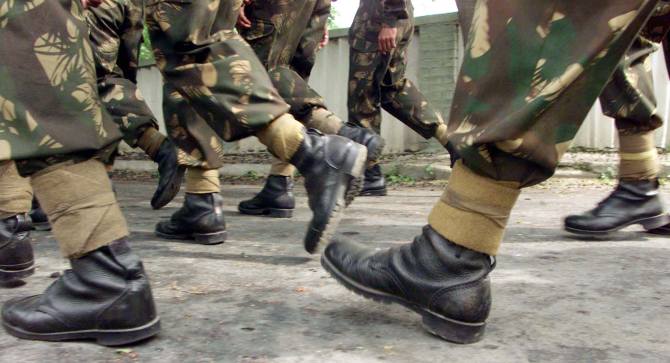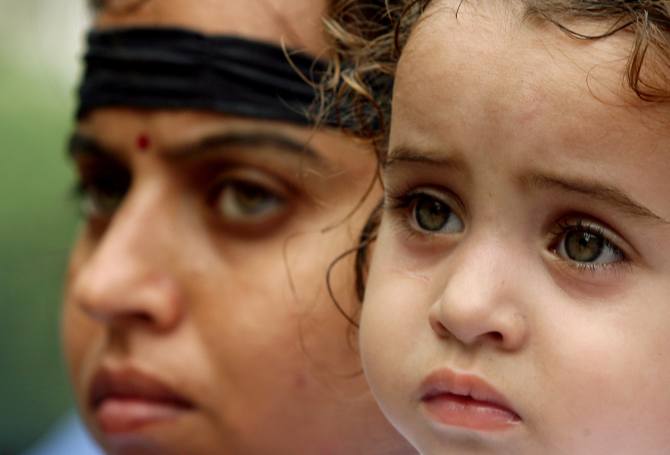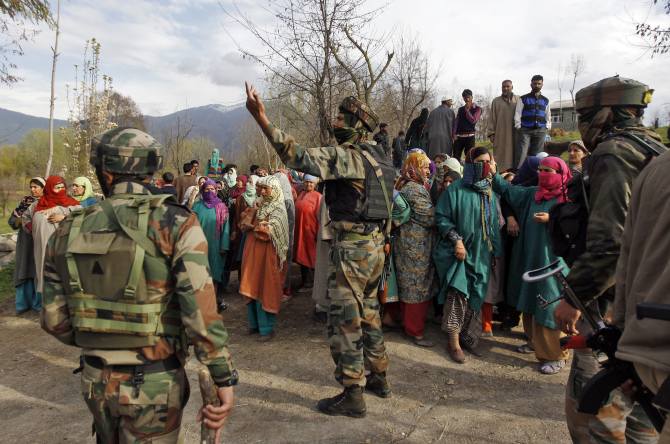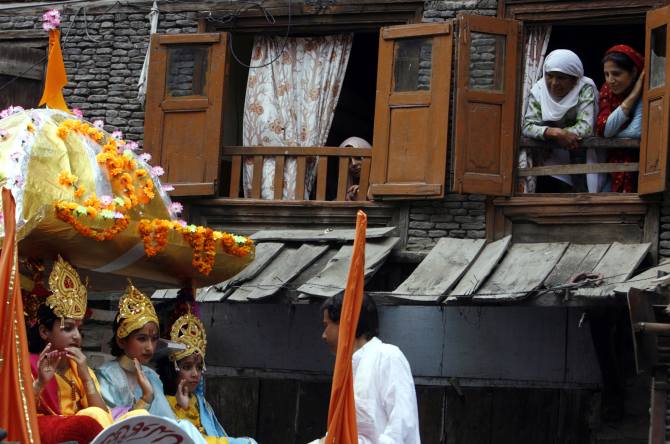 | « Back to article | Print this article |
'No everlasting peace in J&K without Kashmiri Pandits'
'No matter how many homes I own in Delhi, or any part of the world, as far as I am concerned, there is only one home and that is what was left in Kashmir in the 1990s.'
'Over the past few years I have been seething with anger at the kind of ignorance, at the way we were neglected and our story being ignored.'
'Whenever someone talks about our story he is immediately dubbed a Narendra Modi supporter, a very dangerous trend in this country.'
'As long as you are talking about Adivasis in Bastar or the brutalisation of the State nobody raises an eyebrow. But the moment you talk about Kashmiri Pandits -- after all, we were a religious minority in Kashmir -- and how they being in a minority were targeted it doesn't go down well and no one speaks about it.'
'That is the saddest and most ironical aspect of this whole tragedy,' Rahul Pandita, a Kashmiri Pandit and author of Our Moon Has Blood Clots, a book that chronicles the plight of his community in the strife-torn Kashmir Valley, tells Prasanna D Zore/Rediff.com
He is often labelled a Maoist for exposing the brutality of the State's repression of the Adivasis in the name of development in Central India. But just like those tribals who are being uprooted from their homes and hearths Pandita, a Kashmiri Pandit, too was forced into exile by the violent Azaadi movement that gripped the state of Jammu & Kashmir in the late 1980s and early 1990s.
Compelled to live in exile by the circumstances that unfolded in the Kashmir Valley in the wake of the militant movement and the violence perpetrated in the name of Azaadi and religion against the Kashmiri Pandits, Pandita always wanted to chronicle the injustice his community and his family faced in Kashmir.
His wistfulness and anger took shape of the form of Our Moon Has Blood Clots, a riveting story of his family, his community, his people as seen from the eyes of a 14 year old who was old enough to figure out why the Kashmiri Pandits were subjected to insults, humiliation, torture and violence.
In an interview with Prasanna D Zore/Rediff.com, Pandita speaks extensively about his book, the emotional churn he underwent as violence grew in the valley in the 1990s, why the militants selectively targeted Kashmiri Pandits and the road ahead for a final solution.
What made your write a book that chronicles the hardships and exile faced by the Kashmiri Pandit?
I always wanted to write this book because it is about my own family, my own community and my own people whose story (of internal migration) was relegated to the margins for almost quarter of a century.
But I was not sure what form and shape it should take. There was a time when I wanted to write it as a fictional account because I felt that nobody was interested in our story. So I would rather write it in the form of a novel, write the truth but sugar-lace it in the form of fiction.
Meanwhile, years passed by and by the virtue of my full-time job as a journalist who reported widely from Bastar about the Maoists and came out with a couple of books on the subject... but somehow this book was lurking there in the backyard of my mind and I was very eager to return to it as soon as I could.
But also because of the fact that it was personal history I found it extremely difficult to write. In a way writing the book would have meant revisiting some of those very painful memories of those initial years in the exile after leaving our home and hearth and to be rendered homeless all of a sudden in a matter of few days.
There are certain episodes which I have mentioned in my book about the tragic, brutal murder of my brother, or my mother's illness that happened later. In all it was a very difficult book to write.
I was also conscious of the fact that our story was not being told so far and for the past 25 years there has been this one kind of story which has come out from Kashmir Valley from which our story is completely missing.
So, I just wanted to strike out that balance, that other side of the coin which no one is interested in. It is not that people don't know of it but usually the media and the liberal discourse of this country has ignored our story.
So, instead of waiting for someone else to do it for me I did it for myself, my people and I am glad I have come up with it.
Is this book written by Rahul Pandita, the journalist, or Rahul Pandita, the person? What I want to know is how objectively has this book been written?
It is both.
It is written by Rahul Pandita the quintessential Kashmiri, who is rendered homeless at the age of 14.
It is essentially a memoir; it does not claim to be a historical document, which encompasses everything that has happened in Kashmir in the last 100 years.
No single book can do justice to the complete story of Kashmir. But, I am not making those claims. I say this book is a memoir of a Kashmiri Pandit who is rendered homeless.
But as far as the other events are concerned I was also aware of the fact that most of it has to come from my own memory and memory can be tricky at times. That is where I use my skills as a journalist; I checked everything; validated and re-validated all the facts from official documents, newspaper archives etc to make sure that whatever I write is 100 per cent accurate.
Every incident mentioned in the story from the 1986 communal riots which happened in Anantnag in South Kashmir or the way militancy erupted in Kashmir or the way the Kashmiri Pandits were selected one after another, all that is meticulously chronicled and written down with strict journalistic regimen.
Kindly click NEXT to continue reading this interview...
Must Buy: Rahul Pandita's Our Moon Has Blood Clots: The Exodus of the Kashmiri Pandits.
'Whenever someone talks about our story, he is immediately dubbed a Narendra Modi supporter'
What memories haunt you the most about your life as a Kashmiri Pandit in Kashmir and later as an exile in Jammu and later in Delhi?
If you are a Kashmiri from a very early age you are very conscious of who you are. It was true in my case as well.
I was very conscious of the fact that I was a Kashmiri Pandit from very early in my life because of what we saw around us.
When I was growing up and these tensions would simmer up once in a while. But overall, because you were young we were protected from it (by our parents).
That protection was broken in 1989-1990 when thousands of people came out on the roads and brutalised us in this violent spate of frenzy.
I think the most difficult day for us was the night of January 19, 1990.
Thousands of people came out in the streets, assembled in a mosque and started shouting slogans against us. One of which is very prominent and I would like to quote it as I always do to make understand the readers what we went through.
It was a slogan in Kashmiri which went like this: 'Assi gacchi panunuy Pakistan, batav rostuy, batanien saan (We want our Pakistan without Pandit men but with their women).' This episode frightened us a lot.
It did not happen in one locality or one town or one district. It happened at one point of time all across the Kashmir Valley, which clearly specifies it was a well-orchestrated thing.
When one of us was brutally murdered in this bloodied frenzy, it was to make sure that when that person dies it would scare thousands of us into exile. And that is precisely what happened.
In Delhi what is most painful is the permanent sense of uprootedness, homelessness that we keep on talking about.
No matter how many homes I own in Delhi, or any part of the world, as far as I am concerned, there is only one home and that is what was left in Kashmir in the 1990s.
Also, over the past few years I have been seething with anger at the kind of ignorance, at the way we were neglected and our story being ignored.
Whenever someone talks about our story he is immediately dubbed as a Narendra Modi supporter, a very dangerous trend in this country.
As long as you are talking about Adivasis in Bastar or the brutalisation of the State nobody raises an eyebrow. But the moment you talk about Kashmiri Pandits -- after all, we were all a religious minority in Kashmir -- and how they being in a minority were targeted it doesn't go down well and no one speaks about it.
That is the saddest and most ironical aspect of this whole tragedy.
Kindly click NEXT to continue reading this interview...
Buy Parvez Dewan's A History of Kashmir here!
'The Indian State was nowhere to protect us'
As a 14 year old in 1990, what was going through your mind then?
If you read my account of that day in my book you will realise how helpless we all were. We hoped that the BSF (Border Security Force would come and rescue us or the (Indian) Army would come.
But we need to understand one thing, after my book was out, there was lot of untruth and propaganda again about the events of January 19, 1990 where they say that on the night of January 19, 1990 the valley was under a very strict curfew.
So how could people come out on the road and assemble in mosques, to which I say that if you checked the official records you will find out that the whole administrative mechanism had collapsed in the Kashmir Valley in January 1990.
There was no semblance of security anywhere; there were many sections within the Kashmiri police who were sympathetic to the separatist groups and the militants. There was this whole frenzy of Azaadi which was happening.
And even if a curfew was in place it was being defied everywhere and thousands of people were on the road in defiance of that curfew. Curfew really began much later on January 21 when 51 protesters were killed in Gaw Kadal.
After that the curfew was more or less in place when Mr Jagmohan (Malhotra) took over as the governor of Jammu & Kashmir. But even then there were episodes when curfew was defied by the people.
Absolutely, the Indian State was nowhere to protect us.
Was this done on purpose by the Indian State?
No. The Indian State was not in control at all. They did not know what the hell was happening there.
It was a complete failure on the part of the Indian government. They had no inkling of how bad things were turning in the valley right from mid-1989 onwards when the first Kashmiri Pandit killing happened and journalists started coming to Kashmir and if you go through the newspaper reports of that time you will find that time and again veteran journalists who visited Kashmir had warned the government that Kashmir was a ticking time bomb ready to explode anytime.
But not a single government in New Delhi at that time had the vision or the power to understand how bad it was going to be in the next few months.
And when it actually erupted, the Government of India was caught unaware; they were not prepared for it.
The state administrative machinery had completely collapsed, Farooq Abdullah (then the chief minister of Jammu & Kashmir) got scared, and left, and we were left with nothing and had to manage everything on our own.
There were times when Kashmiri Pandits were shot by militants grievously and they were denied treatment even in government hospitals where doctors were sympathetic to the militants and their cause.
Many Kashmiri Pandits died in those few months because of lack of treatment even after they were admitted to the hospitals.
Kindly click NEXT to continue reading this interview...
Buy Terror in Kashmir and Other Stories by Lieutenant General Yashwant Mande here.
'People call me in the middle of the night and cry and howl on the phone telling me that it is not my story, but their story'
What emotional churn did you go through while writing the book as a person who along with his family had to leave their home in the valley just because they happened to belong to a particular community?
It was an extremely difficult book to write about. Somehow, I persisted and apart from a few painful episodes I did not feel much because I was so engrossed in writing the book.
It became like madness for me where I was so fascinated by numbers. I remembered every Kashmiri Pandit who died, his name, his locality, the number of people who died, who died where, under what circumstances.
This became like a demon in my head and it did not let go off me for many, many months.
But after I finished the book and when I was reading a passage for the first time when my book was launched in Delhi last month I realised I was not able to read my own words. I just broke down in the middle of the book launch.
After that I have not been able to read my own book. I can't do it any longer. I completely break down when I read my own book.
How are you coping with this emotional churn? How did you cope with it then?
I think it is really gratifying to see the way this book has been received not only by Kashmiri Pandits, but by many others in India.
There were certain responses from the Kashmir Valley which were expected, hard-hitting, below the belt, calling my book a pack of lies; somebody has written that I am a lowly worm. But that gives me a lot of strength because when you read such reactions you know it has hit them very hard and it is no longer possible for them to ignore the truth.
For the first time this book has lent a very serious dent to the popular discourse on Kashmir which they have propagated in the last two decades or so. That is no longer possible because there are people who were once sympathetic to the Kashmiri cause who are now asking questions to the same people as to what they did to Kashmiri Pandits.
As far as response of my own community is concerned, I am overwhelmed by the responses I have got.
People call me in the middle of the night and cry and howl on the phone telling me that it is not my story, but their story. Most of us went through similar experiences.
Kindly click NEXT to continue reading this interview...
Have you read M J Akbar's Kashmir, Behind the Vale? No? Then, buy it here.
'The people by and large in Kashmir are tired of the last 25 years of violence'
What explains the distrust between Kashmiri Muslims and the Pandits in the 20th century who for a considerable period of time had co-existed peacefully? Or is it wrong to think that the two ever lived peacefully?
The word Kashmiriyat which is quite often used in the media discourse is a misnomer. There has always been some kind of bitterness between the Kashmiri Pandits and the Kashmiri Muslims.
That is because of two reasons: One, there has always been bitterness between India and Kashmir and we (the Kashmiri Pandits) were always seen as symbols of India.
We paid very heavy price for two things. One for upholding the national flag and one for upholding our religious identity.
When the so-called Azaadi movement erupted in Kashmir in 1989-1990, it was all religious. We were targeted because we were Kashmiri Hindus. That distinction has to be made very clear.
I am not blaming every Kashmiri Muslim for what happened to us, but there is a significant number of people or ordinary Kashmiri Muslims who took an active part -- directly or indirectly -- in forcing us into exodus.
It is not only the Islamist militants who went across the Line of Control, underwent arms training, acquired arms and returned. What they (the militants) did could not have been possible without (the support of) many people from the majority community.
Did you ever try to analyse the reason behind their anger against the Kashmiri Pandits?
The first anger was they wanted to get us out because that religious fervour was there. If you analyse their slogans -- there are some elements of it which are political in nature, but as far as the Azaadi movement of the 1990s is concerned, as far as that exodus of Kashmiri Pandits from the valley is concerned -- they are completely Islamist in nature.
Slogans can tell you a lot.
What people shout on the streets can tell you a lot about the nature of any movement.
If you analyse all the slogans which were popular on the streets of Kashmir in 1989-1990 and even now, they are all Islamist (in nature).
'Hum kya chahte hai, Nizam-e-Mustafa', which means, what we want is Islam rule, where there is no space for any other community or religion. That is what anchored the whole Azaadi movement in 1989-1990 and that still is in that sense.
We have to make that distinction very clear.
The situation in Kashmir as far as the Azaadi movement is concerned has not changed much till this date. Is that what you are saying?
No, the people by and large in Kashmir are tired of the last 25 years of violence. They want a better life. But these people are silenced in the name of Azaadi.
Kindly click NEXT to continue reading this interview...
Buy the fascinating The Meadow: The Kashmir Kidnapping That Changed the Face of Modern Terrorism here.
'The health minister denied my uncle a medical seat, saying it had to go to a Kashmiri Muslim'
How would you react to the school of thought that believes that the Kashmiri Pandits, who by the virtue of their education and knowledge had occupied position of power in the state administration by sidelining Muslims, thereby leading to a sense of alienation among Kashmir's Muslims?
Or what do you think of another theory that blames the central political leadership in India post Independence in its bid to make Kashmir an integral part of India imposed a Hindu minority in the state's bureaucracy?
I would like to respond to this in three parts.
When a lot of these intellectuals say that Kashmiri Pandits enjoyed lot of power have they analysed any kind of data to back what they are saying? They say the Kashmiri Pandits connived with the Dogra rulers to subjugate Muslims in the state.
Kashmiri Pandits, by virtue of them being educated and literate, a very handful of them were bureaucrats -- ordinary patwaris and tehsildars -- under the Dogra rulers because they could keep accounts and knew how to write letters. But they enjoyed no powers.
If that was the case, that all top government officers in the state were Kashmiri Pandits, then how could what happened to us in 1989-1990 been possible?
I will give you the example of my uncle who by virtue of his merit got a medical seat which was later denied to him because the health minister at that point of time told him that was how it worked as at that point of time there were no medical exams.
He denied my uncle that seat, saying that the seat has to go to a Kashmiri Muslim.
Hypothetically speaking, even if there were Kashmiri Pandits who may have subjugated Kashmiri Muslims during Dogra rule, then does it mean that you ethnically cleanse them? This is a very dangerous kind of trend used by the intellectuals of this country.
This is the same logic that is used in many other contexts.
It is the same logic that many use to justify the 1984 riots against the Sikhs.
In the 14th century Islam came to Kashmir by virtue of the sword where thousands of Kashmiri Pandits were massacred brutally, forcibly converted to Islam. There were times when only 11 Kashmiri Pandit families were left in Kashmir.
Does that mean that the existing Kashmiri Pandits should kill all the Kashmiri Muslims for what was done by their ancestors hundreds of years ago?
This dangerous logic should be avoided at all costs.
These three distinctions have to be made clear as far as the Kashmir discourse is concerned.
Kindly click NEXT to continue reading this interview...
Want to know more about Kashmir and Its People? Buy this book.
'In my lifetime I will make sure I return to Kashmir and it will be permanent'
What is the road ahead for reconciliation?
The problem is many in Kashmir and many who deal with Kashmir outside the state have double standards when it comes to their public and private stance on Kashmir.
Kashmir in the past few years has become a cottage industry for all these people who go to the valley, write their reports and that is how they earn their money.
My public and private stand on Kashmir is that as Kashmiris we need to move on.
But that moving on will not be possible unless we have a Truth and Reconciliation mechanism that we keep talking about. But that is not possible till there is consensus on the circumstances that led to the exodus of Kashmiri Pandits.
No matter what India, Pakistan or the majority Kashmiri community does in Kashmir, there will be no everlasting peace in Kashmir till the issue of Kashmiri Pandits is solved.
As somebody from a community that lives in exile, who do you identify the most with among other such communities in the world facing a similar fate?
There are times when people ask me why do I go to Bastar and why do I write in favour of the Adivasis there. That I am writing in the favour of the Adivasis makes me a Maoist supporter (smiles), which is not the case.
All I am saying is that because of my own homelessness I know what losing a home, a house which has taken you generations to build, means to a person. So when I go to Bastar I see these Adivasis being displaced from their land -- their ancestors lived there for thousands of years -- that empathy comes from there.
It doesn't matter where similar episodes have taken place: In Bosnia or Rwanda or what happened to the Jews during the Second World War or what is happening to the Palestinians now. I think I identify with all of these moments. I really understand their pain and suffering.
Could you recount any incident when militancy was at its peak that a Kashmiri Muslim came forward to help a Kashmiri Pandit and showed Kashmiriyat?
It didn't happen to us personally, but there have been a few cases as it happens during any riot or any massacre.
There are so many examples of Hindu neighbours helping the Sikhs, saving their lives in Delhi.
The same thing also happened in the Kashmir Valley. There are a few such cases and they need to be talked about.
When you talk about a pogrom, or a massacre or ethnic cleansing, what is to be taken into account is the significance of numbers of what the majority community was doing at that point of time and that was sadly against Kashmiri Pandits and they took an active part in the brutalisation and ethnic cleansing of Kashmiri Pandits.
That is the sad aspect of this complete story.
Do you hope that in your lifetime you and many other Kashmiri Pandits like you will get a chance to live again in Kashmir and call it your home?
Like I say at the end of the book, in my lifetime, I will make sure that I return to Kashmir and that time it would be permanent.
Do you think the BJP is serious about solving the issue of Kashmiri Pandits now that it finds mention in their election manifesto?
Individually, a few leaders may have helped the community. But as a party, the BJP has been a complete failure when it comes to the issue of Kashmiri Pandits. Just like the Congress.
Buy Rahul Pandita's powerful book, Hello Bastar:The Untold Story Of Indias Maoist Movement.
